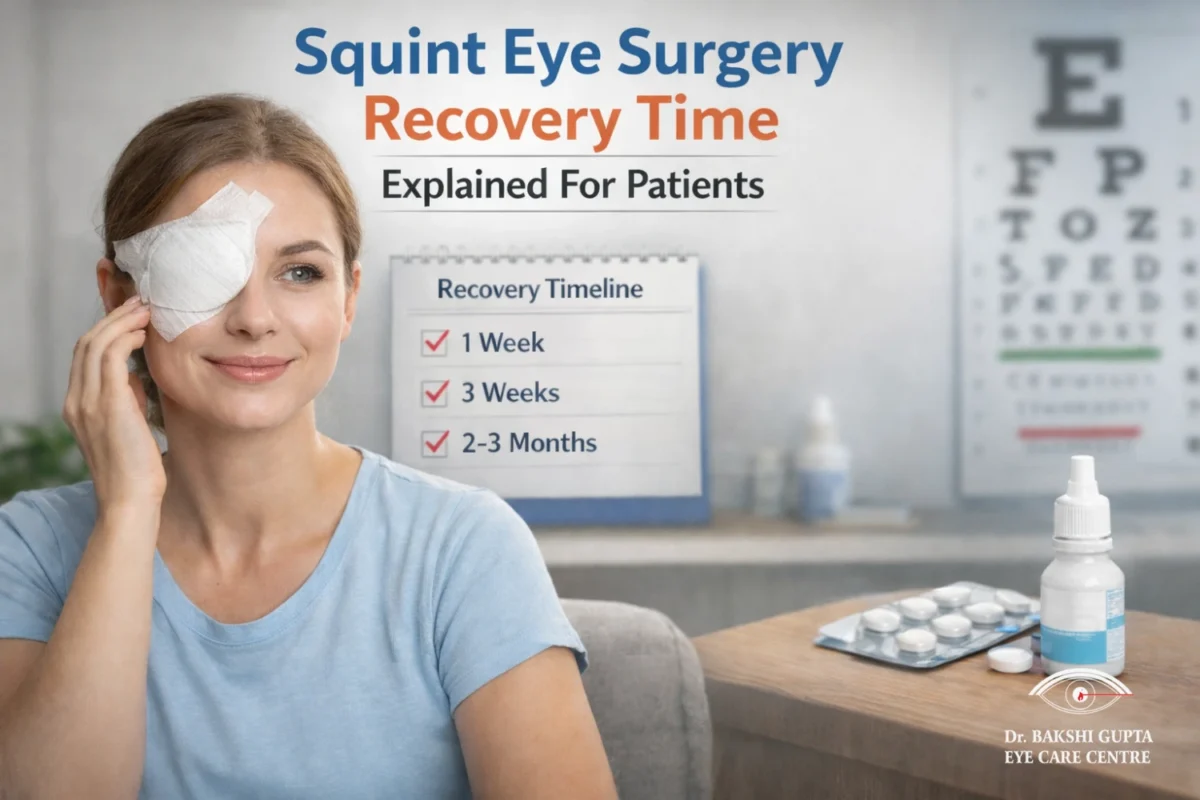If you or your loved one is planning to undergo squint correction, one question always comes first: how long is the squint eye surgery recovery time? Understanding recovery is just as important as understanding the procedure itself. A clear idea of squint eye surgery recovery time helps patients prepare mentally, physically, and practically for life after surgery. This detailed guide explains squint eye surgery recovery time step by step, covering what happens immediately after surgery, what to expect in the first week, and how long full healing takes. We will also discuss squint eye surgery recovery, common symptoms, do’s and don’ts, and tips for faster healing. What Is Squint Eye Surgery and Why Recovery Matters Squint eye surgery, also known as strabismus surgery, is performed to correct misalignment of the eyes. During the procedure, eye muscles are tightened or loosened to bring the eyes into proper alignment. While the surgery itself is usually short and safe, recovery after squint surgery plays a critical role in achieving long-term success. The squint operation recovery time varies depending on age, health condition, and surgical complexity. Understanding the recovery process helps reduce anxiety and ensures patients follow the right precautions for smooth healing. Squint Eye Surgery Recovery Time Before diving into details, here’s a simple overview of squint eye surgery recovery time: Although visible improvement may appear early, complete recovery from squint surgery takes time and patience. Immediate Recovery After Squint Eye Surgery (First 24 Hours) The first 24 hours are crucial in determining how comfortable your squint eye surgery recovery time will be. What You May Experience These symptoms are completely normal during early recovery after squint eye surgery and usually settle within a few days. Pain Management Doctors typically prescribe mild painkillers and antibiotic eye drops. Avoid rubbing your eyes, as this can delay squint eye surgery recovery. Squint Eye Surgery Recovery Time in the First Week The first week is often the most uncomfortable phase of recovery after squint surgery, but improvements happen quickly. Day 2 to Day 7 Recovery Despite these symptoms, most patients feel well enough to move around within 48 hours. Proper care during this phase shortens overall squint operation recovery time. Dos and Don’ts During Squint Eye Surgery Recovery Following precautions strictly can significantly improve recovery after squint eye surgery. Dos Don’ts Ignoring these precautions may prolong squint eye surgery recovery time. Recovery After Squint Eye Surgery in Children Children often recover faster than adults. Squint eye surgery recovery time in children is usually shorter because their tissues heal more quickly. What Parents Should Expect However, strict follow-up is essential to ensure proper eye alignment during recovery from squint surgery. Squint Eye Surgery Recovery Time in Adults Adults may take slightly longer for complete recovery after squint surgery. Common Adult Recovery Challenges On average, squint operation recovery time for adults ranges from 4 to 6 weeks. Vision Changes During Recovery After Squint Eye Surgery Temporary vision changes are part of normal squint eye surgery recovery. Is Double Vision Normal? Yes. Double vision may occur as the brain adjusts to new eye alignment. This usually resolves within days to weeks during recovery after squint eye surgery. When to Worry If vision worsens significantly or pain increases suddenly, consult your doctor immediately. How Long Does Redness Last After Squint Surgery? Redness is the most visible sign during squint eye surgery recovery time. This does not mean recovery is delayed. Redness fades gradually as recovery from squint surgery progresses. When Can You Resume Normal Activities? Understanding activity timelines helps manage squint eye surgery recovery time better. Activity Safe Timeline Reading 3–5 days Screen use 5–7 days Office work 7–10 days Exercise 2–3 weeks Swimming After 3–4 weeks Always follow your doctor’s advice for smooth recovery after squint surgery. Follow-Up Appointments and Their Role in Recovery Follow-ups are essential to monitor squint eye surgery recovery. Why Follow-Ups Matter Skipping appointments can negatively affect long-term recovery from squint surgery. Factors That Affect Recovery Time Not everyone heals at the same pace. Factors influencing recovery time include: Patients with good compliance experience smoother recovery after squint eye surgery. Can Squint Return After Surgery? In some cases, slight misalignment may reappear over time. This does not mean recovery failed. Vision therapy or glasses may help stabilize results after recovery from squint surgery. Tips to Speed Up Squint Eye Surgery Recovery Here are proven tips to shorten squint operation recovery time: Consistency is key to faster squint eye surgery recovery. Emotional and Psychological Recovery After Squint Surgery Beyond physical healing, emotional adjustment is part of recovery after squint eye surgery. Many patients feel more confident once alignment improves. Temporary cosmetic changes during squint eye surgery recovery time should not cause worry—they are part of healing. Long-Term Results After Recovery from Squint Surgery Once complete recovery from squint surgery occurs, most patients enjoy: Long-term success depends heavily on proper squint eye surgery recovery. FAQs: 1. How long is squint eye surgery recovery time? Most patients recover within 3–6 weeks, though minor healing may continue for up to 3 months. 2. Is pain normal during recovery after squint eye surgery? Mild pain or discomfort is normal and usually resolves within a few days. 3. Can I go to work during squint eye surgery recovery? Yes, desk jobs can usually be resumed within 7–10 days. 4. How long does redness last after squint surgery? Redness typically fades within 2–4 weeks during recovery after squint surgery. 5. Is double vision common during recovery from squint surgery? Yes, temporary double vision is common and usually resolves on its own. 6. Can children return to school quickly after squint eye surgery? Most children can return to school within a week. 7. Are eye drops necessary during squint eye surgery recovery? Yes, eye drops prevent infection and reduce inflammation. 8. When is complete recovery from squint surgery achieved? Complete recovery usually occurs within 2–3 months. Final Thoughts Understanding squint eye surgery recovery time helps patients set realistic expectations and recover with











